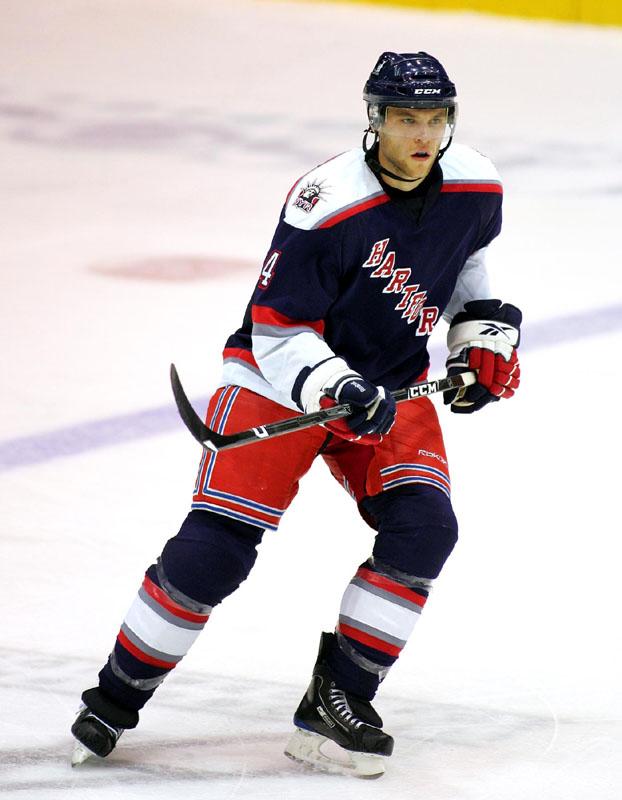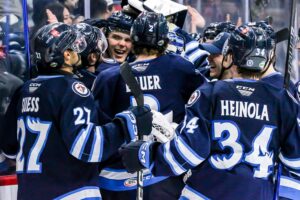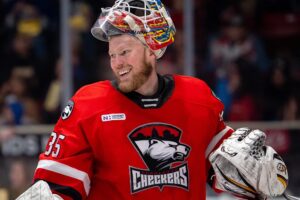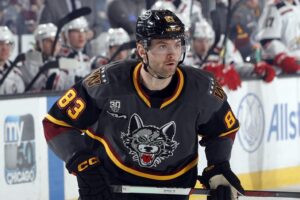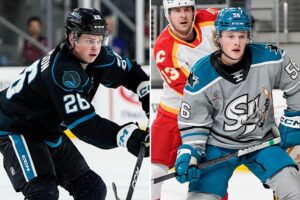by Bob Crawford || AHL On The Beat Archive
There have been some great athletic families throughout the history of sports, but not too many have much on the Sauer family of Sartell, Minnesota.
Peggy and Curtis Sauer have six children, and when the Wolf Pack’s Michael Sauer played three NHL games last season for the New York Rangers, he became the third Sauer son to play major pro sports.
Craig Sauer, the oldest of the Sauer kids, was an NFL linebacker for five seasons from 1996-2000, playing for the Atlanta Falcons and Minnesota Vikings. Kurt Sauer, who is six years older than Michael, has spent all but four games of his eight-year pro hockey career in the NHL.
“It was pretty crazy,” remembers Michael about growing up in a house that also included another brother, Kent, who played briefly for the Milwaukee Admirals. “We’re all really competitive. I got to play more probably with Kurt, he and I hung out a lot during my young teenage years, but my oldest brother, he was quite a bit older.”
Craig had 17 years on Michael, the baby of the family, and Michael remembers with a chuckle how NFL-toughened Craig helped drive his younger siblings to reach their highest potential of athletic prowess.
“He (Craig) was always the one, when we’d be training together, he’d kind of lead the workouts and stuff,” Sauer says. “I remember being like 12 years old and running up hills and things, doing jumps with weight vests and wanting to throw up, but he’s yelling at you the whole way up so you just do it. At the time I hated it, but after a month or so you could see the results.
“That work ethic was something he really brought to the table, and that was handed down from my mom. She’s always worked hard, and has a good job, and never quits at anything. She’s like the Energizer Bunny, and I think we all took a little bit of that into our athletics.
“She’s a nurse-anesthetist, and raising six kids and working full-time and doing the whole bit, she’s quite the trooper. We’re very fortunate.”
The highlight of Craig’s NFL career was a trip to the Super Bowl with the Falcons in January 1999. Although Atlanta ended up losing that game, 34-19, to John Elway and the Denver Broncos, Michael has nothing but positive memories of supporting his big brother’s quest.
“That was unbelievable,” Michael says of that Falcons run. “I think I was 12 or 13, and actually the NFC Championship Game was in Minnesota against the Vikings, and the Falcons won in a big upset on an overtime field goal. And I remember I went to school the Friday before and I was the only kid with an Atlanta Falcon jersey on. And if you’re from Minnesota you know that if the Vikings are doing well, everybody’s in purple and gold. I wore it again that next Monday, and I think I sat by myself at the table. Nobody wanted to sit by me, kids were crying, it was unbelievable.
“And the Super Bowl was down in Miami, and we had our whole family there I think and got to go to the game and the NFL Experience. They had a little thing out there where you could run through all the drills, and being 12, 13 years old I loved it, I played football and it was a blast. And to see him out there, I think he had a few tackles that game, it was cool. Just the whole atmosphere, it’s something you can’t really explain until you get there.”
One might wonder, how was it that Craig ended up a football player in a hockey-mad state like Minnesota, and three other sons pursued the stick-and-puck route? Turns out the head of the family is one Minnesotan who was not smitten with hockey.
“My dad didn’t even know about hockey,” says Michael. “He played professional baseball, in the minor-league system with the Minnesota Twins. Where he’s from (Royalton), it’s a small-town Minnesota place, and they don’t even have a hockey rink there. He never knew hockey, so he always played football and basketball and baseball. So Craig was always a good athlete, and he played quarterback and did all that.
“Then my other brothers, and my sisters, did swimming, and they actually won state championships as like seven-year-olds and eight-year-olds in breaststroke and butterfly, they were the best for their age group. Their swimming coach came to my parents, though, and told them that they didn’t have the lean bodies of swimmers and said, ‘why don’t you put them in hockey?’ And my dad’s like, ‘hockey?’ I think he said he went to one game his whole life. But he said, ‘OK, whatever’ and he asked the kids and the kids said yeah, they’d like to play.
 |
| • Small-town boys, big-league dreams |
| • Monsters make for happy holidays |
| • Sound Tigers banking on money goalies |
| • AHL ON THE BEAT ARCHIVE |
“At first it was kind of rough getting into it, Kent took to it right away, but Kurt (the future NHLer), on the other hand, I guess would just kind of walk around the boards crying because he didn’t want to be on the ice.
“So it just kind of started out like that. My dad just gave it a shot and the kids loved it, and it just kind of kept coming down. And the only reason I got into it is because a neighbor kid was a big hockey player, and I was always playing out there on the ice, but I always figured my parents were so busy with the other kids, I didn’t know if I was going to get to do it. But with my neighbor being the same age and being able to get rides with them, my parents were like, ‘OK, we’ll do it’. So I got all the hand-me-downs, like it always works in a big family, and it all worked, it took care of us.”
The Sauer boys’ hockey careers are somewhat interesting in that, despite being from a state where college hockey is huge, with the University of Minnesota having a storied program, and there being a Division One college team (St. Cloud State) right in their backyard (Sartell is just outside of St. Cloud), Kent, Kurt and Michael all made their way to the pro hockey ranks via the Junior Western Hockey League.
“Kent originally went to college, he played his freshman year at University of Minnesota-Duluth, and they didn’t have a good team that year and it just wasn’t a good fit for him,” Michael says by way of explanation. “And when he decided to go to the WHL, Kurt also looked into that, just because of the situation that Kent was in. And it worked out well for both of them. Kurt got to play for (current Detroit Red Wings coach) Mike Babcock (for Spokane of the WHL), and for Kent, it was good for him to get out of Division One because he wasn’t playing very much.
“And when it came my time, surprisingly enough, I was actually going to try to go to college. That was the plan. I was drafted in the WHL, but I really did like school and I was thinking I really wouldn’t mind going to university. But when I was 17 I tried to go to the USHL, the development league for college, and they cut me. And it was a tough time, I was 17 years old, it was my draft year, I thought I played well enough to make it, I had a good camp and everything. And they cut me, so I was thinking, ‘well, if I can’t make USHL, I’ve got to go try making a different junior team’. Because I felt like to was time to move on and not go back to high school hockey. And (WHL) Portland gave me a call and asked me to come try out again, so I went out there and camp went well and they wanted me, so I just decided that was going to be the route, and the rest is history.”
The Sauer family has not only succeeded in pro athletics, two of Michael’s sisters are working at the highest levels of the medical profession. His oldest sister, Kelly, is four years out of medical school and is working as a doctor of physical medicine and rehab, and Christine, who is the second-youngest in the family next to Michael, is studying to be a doctor of pharmacy.
Obviously, mom and dad did not permit sacrificing schoolwork for sports.
“It wasn’t forced, but they knew we were capable of a lot, so they really pushed us to be the best we can be,” Michael says of what his parents instilled in their brood of six youngsters. “If we were going to be anything, they said do it to the best of your ability and don’t do anything halfway. You always made sure your grades were up, but my parents were pretty lenient, as long as we got good grades and stuff they weren’t too hard on us. We were all good students, pretty close to straight A’s and 4.0’s, so they just wanted to make sure we always kept a good approach to everything.”
Being the youngest kid in such an athletic family, Michael has been able to benefit from all of his older siblings’ experience throughout his own playing career. That has been an immeasurable help to the 22-year-old defenseman.
“They’d been there, and gotten through all the ups and downs,” he says of his brothers and their high-level sports exploits. “Especially when you get more toward the professional level, or even juniors, it’s a very competitive sport and the highs are high and the lows are low. It can be day-to-day, and it’s one of those things where you’ve just got to be able to slough off (the lows) and just show up and have a good day the next day and it’s all forgotten.
“They helped me with pretty much everything. We trained together during the summers, and if we’re going through something we’ve always got somebody to talk to that’s been there and done that or had an experience or seen it. They all have a lot of wisdom, having gone through all that.”
Craig and Kent, the two oldest brothers, have long since retired from pro sports, but Kurt’s NHL career, which has included a trip to the Stanley Cup Finals with Anaheim in 2003, is still going strong. So there is a very real possibility that Michael could find himself lined up across from his big brother in some NHL action in the near future. For Michael, that would be a huge thrill.
“That would be really cool,” he says. “I’ve watched him (Kurt) play, all growing up and the whole way, and to finally get to play against him, that would be exciting, just to see him on the other side. You watch him on TV and stuff like that, it would definitely be something I’d remember. I remember hearing that Kent and Kurt got to play against each other in Major Juniors and I thought of how cool that would be, after the game they go give each other a hug on the ice, and I was like, ‘gosh, that’s so cool’. You battle each other through the whole game, run him through the boards, do whatever you can and then at the end of it you’re still brothers. It’d be definitely a lot of fun.”
For Peggy and Curtis back in Sartell, it might represent a bit of a dilemma, whom to root for when their two sons might lock horns, but Michael is confident that it wouldn’t faze them.
“I think they’d just sit back and enjoy it,” he says with a smile. “However the game turns out, they’d just hope both of us played well and did a good job.
“They’re obviously proud of us. Whatever we do, they’re happy, as long as we’re happy and staying focused and keeping our eyes on the right areas and doing what you love. That’s something they’ve always kind of told us to do. And they have a lot of wisdom. It’s something that’s nice, to be able to call your mom and dad and they can shed some of that to you, and it’s been a blessing to have that.”
Peggy and Curtis Sauer have certainly been blessed, too, by having all their children reward their parenting efforts handsomely, not only on their various playing fields (or surfaces), but in all their lives’ pursuits as well.

































